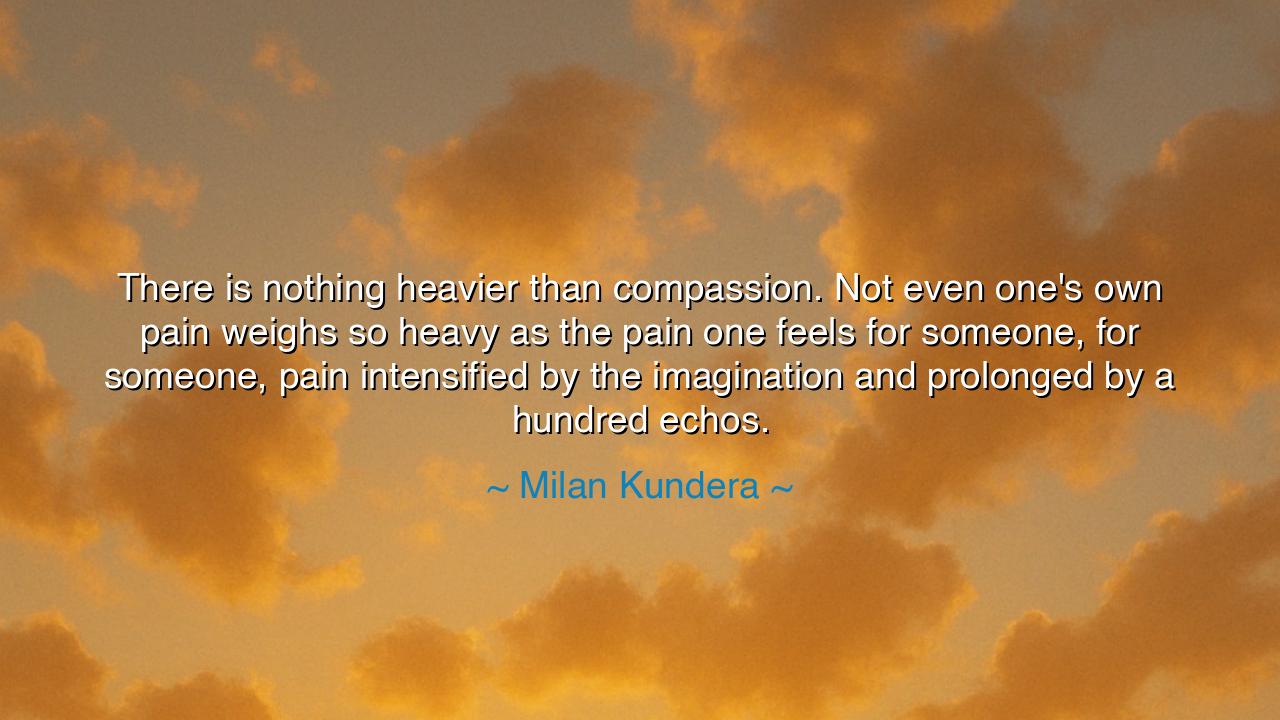
There is nothing heavier than compassion. Not even one's own pain
There is nothing heavier than compassion. Not even one's own pain weighs so heavy as the pain one feels for someone, for someone, pain intensified by the imagination and prolonged by a hundred echos.






The Weight of the Heart: The Burden of Compassion
Hear these words, O traveler of the soul, from the philosopher Milan Kundera, who once wrote: “There is nothing heavier than compassion. Not even one’s own pain weighs so heavy as the pain one feels for someone, for someone, pain intensified by the imagination and prolonged by a hundred echoes.” These are not the words of a cold thinker but of a man who had gazed long into the chambers of the human heart. For in this utterance lies the great paradox of existence — that compassion, the purest of human virtues, is also the heaviest of burdens. It is the divine sorrow that unites us, yet humbles us with its weight.
To feel compassion is to allow the boundary between self and other to dissolve. It is to take upon one’s own heart the anguish of another, to make their suffering one’s own. One’s personal pain may be sharp, but it is singular — it ends where the body ends. Yet compassion opens the gates wide, and through them floods the grief of the world. It is not a wound that can heal, for it is born of love, and love cannot close its eyes. That is why Kundera calls it “heavier” — because in compassion, one carries not only one’s own sorrow, but the multiplied pain of countless hearts, each echoing within the vast cavern of imagination.
The ancients understood this mystery. In the East, the Bodhisattva vows to postpone his own liberation until all beings are free from suffering. In the West, the Christ figure bears the sorrows of mankind upon his shoulders, not for his own salvation, but for love of others. Both stand as symbols of the same truth: that compassion is sacred, but it is weighty. It is not the weakness of the sentimental, but the strength of the brave — those who dare to feel deeply in a world that teaches detachment as safety. To love in such a way is to choose suffering willingly, and in doing so, to become more fully human.
Yet Kundera speaks of something more subtle — that this pain of compassion is magnified by the imagination. For imagination allows us to see not just one person’s suffering, but all its possibilities — their fear, their isolation, their dreams lost, their future broken. The mind creates “a hundred echoes,” each one an image of sorrow that resounds within us long after the moment has passed. This is why the sensitive heart cannot easily find peace. The artist, the poet, the mother, the friend — all who possess imagination are both blessed and burdened. They can feel another’s anguish as vividly as their own, and their empathy becomes an unending current that shapes their soul.
Consider the story of Florence Nightingale, who walked among the dying soldiers of the Crimean War. Her own body was frail, yet her compassion was immeasurable. She could not look upon their suffering and remain still. Her imagination did not merely register their pain; it magnified it, made it unbearable until she acted. She transformed that weight into light — into hospitals, reforms, and mercy that outlived her. Here lies the secret: though compassion is heavy, it can become the very force that lifts the world.
But many flee from this burden. They harden their hearts, telling themselves that to care is weakness. They numb their imagination, for to imagine too vividly is to ache too deeply. Yet in doing so, they cut themselves off from the current of life itself. For it is only through compassion that the spirit grows vast enough to contain others. The heart that refuses to feel becomes small, but the heart that endures the weight of empathy becomes infinite. The wise do not escape the heaviness of compassion — they learn to carry it with grace.
So, what then shall we learn from Kundera’s words? That compassion is both sorrow and strength. It is a cross and a crown. It will break you open, yes, but in that breaking, it will make room for the world to enter. Let your imagination not be your torment, but your teacher — for it allows you to see through another’s eyes and to act with greater mercy. When you feel the heaviness of caring too much, do not seek to cast it off. Instead, use it to build, to heal, to love. For though compassion may be the heaviest thing one can carry, it is also the only weight that gives life meaning.
And so, O listener, remember: Your pain is yours alone, but your compassion makes you part of all humanity. Do not fear its burden — it is the sign of your awakening. For when the heart grows heavy with the suffering of others, it is because it has become vast enough to hold the world.






AAdministratorAdministrator
Welcome, honored guests. Please leave a comment, we will respond soon